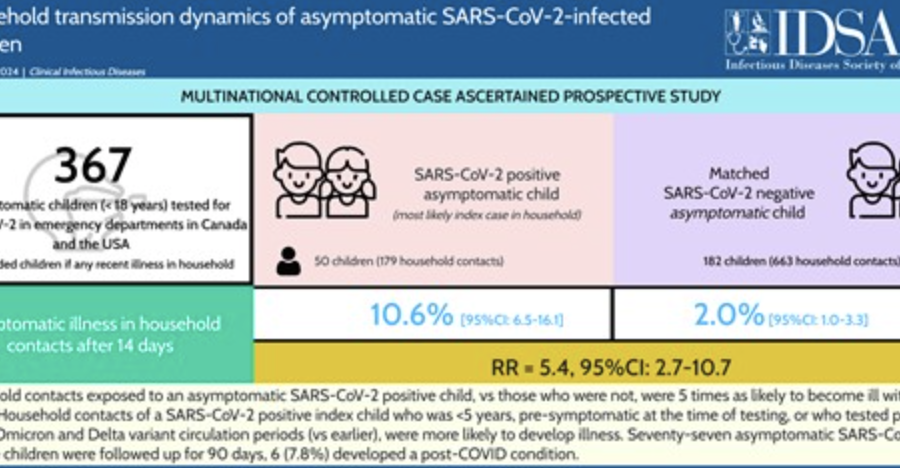Abstract
Background
Asymptomatic SARS-CoV-2 infection in children is highly prevalent but its acute and chronic implications have been minimally described.
Methods
In this controlled case-ascertained household transmission study, we recruited asymptomatic children <18 years with SARS-CoV-2 nucleic acid testing performed at 12 tertiary care pediatric institutions in Canada and the United States. We attempted to recruit all test-positive children and 1 to 3 test-negative, site-matched controls. After 14 days’ follow-up we assessed the clinical (ie, symptomatic) and combined (ie, test-positive, or symptomatic) secondary attack rates (SARs) among household contacts. Additionally, post–COVID-19 condition (PCC) was assessed in SARS-CoV-2–positive participating children after 90 days’ follow-up.
Results
A total of 111 test-positive and 256 SARS-CoV-2 test-negative asymptomatic children were enrolled between January 2021 and April 2022. After 14 days, excluding households with co-primary cases, the clinical SAR among household contacts of SARS-CoV-2–positive and –negative index children was 10.6% (19/179; 95% CI: 6.5%–16.1%) and 2.0% (13/663; 95% CI: 1.0%–3.3%), respectively (relative risk = 5.4; 95% CI: 2.7–10.7). In households with a SARS-CoV-2–positive index child, age <5 years, being pre-symptomatic (ie, developed symptoms after test), and testing positive during Omicron and Delta circulation periods (vs earlier) were associated with increased clinical and combined SARs among household contacts. Among 77 asymptomatic SARS-CoV-2–infected children with 90-day follow-up, 6 (7.8%; 95% CI: 2.9%–16.2%) reported PCC.
Conclusions
Asymptomatic SARS-CoV-2–infected children, especially those <5 years, are important contributors to household transmission, with 1 in 10 exposed household contacts developing symptomatic illness within 14 days. Asymptomatic SARS-CoV-2–infected children may develop PCC.
